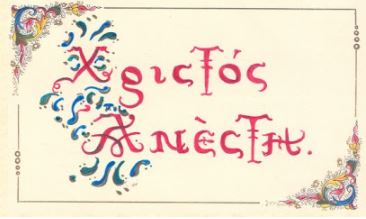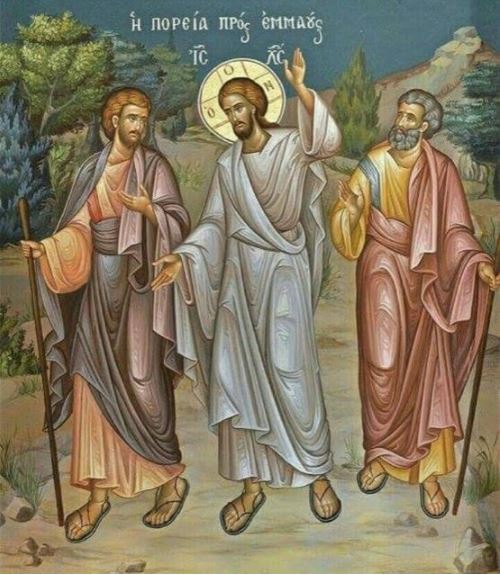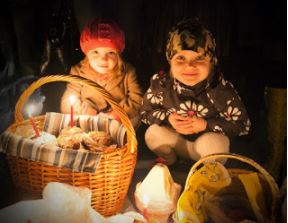SSCORRE!
Saint Sophia Cathedral
Online Resources for our Religious Edification
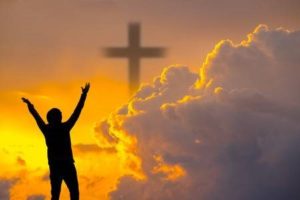
Topic of the Week – Beyond Pascha
“Forty days of Great Lent having been completed, along with Holy Week, and the Great Feast of Feasts, Pascha, having been marked in the Church, it is very easy to take a deep breath and say, “Now, that’s done!” And with the exhalation we take our leave of a liturgical feast and return to our daily routine and schedule. Just as the modern world has little understanding of the meaning of fasting, so, too, does it fail to understand the meaning of liturgy. Liturgy is not a means of marking time on a calendar – liturgy is a means (and mode) of existence….”
Excerpted from Beyond Pascha – Glory to God for All Things (ancientfaith.com)
Adult/Family:
“…Liturgy and the Feasts of the Church are thus not mere calendar events which mark the annual remembrance of occasions now lost within history. What we celebrate are events within the Kingdom of God – now manifest in our midst. The liturgy continually initiates and renews us in the life of the age of come.
The opposite approach (one which dominates our modern world) is to see liturgical events as simply things among other things. They mark historical events, now past, and, as such, are reminders not of God’s presence, but His absence. Thus the modern Easter easily becomes a feast of the Christ that was (who can barely compete with the chocolate and bunny rabbits)….
This historical sense of living “in-between” adds a twist to the two-storey experience: it is rooted in our modern understanding of history and time. It is easy, almost obvious, to think of ourselves as living between major events in the Christian story. Two-thousand years have passed since the resurrection of Christ. Christians continue to wait for His second-coming. How do we not perceive ourselves as living in-between?…”
Preschool/Elementary:“The first week after the Resurrection of Our Lord, Pascha, is called Bright Week. There is no fasting throughout the week even on Wednesday and Friday because the entire week is considered to be one continuous day, instead of morning and evening prayers the Paschal Hours are read, and people try to attend church services more often and partake of the Holy Mysteries.”
Click Bright Week Quick Facts to learn some other facts and interesting traditions that occur during Bright Week.
Middle School/High School:
Unending Podvig – The Sweetness of Grace
We have four periods in the church year where we fast and prepare for one of the Great Feasts, four chances to refocus and make a conscious commitment to struggle. Sometimes we do well in these periods of preparation, sometimes we start out well and end poorly, and sometimes we get to the end and feel as though we haven’t even started. That is how I felt one Pascha. After fasting for fifty days, I had arrived at the greatest celebration of the year, and I felt I couldn’t fully participate in the feast because I hadn’t done enough, hadn’t prepared enough to warrant such a glorious celebration.
At the beginning of the Paschal Matins, I was reflecting on my disappointment, feeling as though I had arrived at the feast shamefully unprepared and unworthy. But listening to the hymns about meeting Christ with a pure heart and clean senses, I realized that the podvig, the spiritual struggle, doesn’t end with the feast; it continues. Yes, while my heart wasn’t pure and my senses were not clean as of yet, there was still hope.
“Let us cleanse our senses, that we shall behold Christ, shining brightly with the unapproachable light of the Resurrection,” the chanters sing out. I heard them and thought, I can continue the struggle and produce fruit worthy of Christ even while feasting. Sure, I was late. Sure, I should have done more in the fast, we can always do more, but I’m not going to let despondency creep in and take hold, especially not on the evening in which Christ banished death and arose from the grace, “giving us eternal life and great mercy.”
Bright Week, the week of feasting following Holy Pascha, is called “Renewal Week” in Greek. I think this word, renewal, is a perfect description. The days and weeks after the Feast of the Resurrection are days in which our struggle, our conviction, is renewed. The renewal we started in the fast period continues, and our hearts become more pure the more we struggle. The struggle doesn’t end when the fast ends; it just takes on a more hopeful tone. We trudge along, singing about Christ’s victory over death, all the while seeking participation in His victory, seeking renewal and resurrection.
Excerpted from The Sweetness of Grace: Stories of Christian Trial and Victory, p119-120 by Constantina R. Palmer
A Message from Maria Spanos
I am passionate about our Orthodox Christian faith and seek to help others learn as much as they can about it. My purpose here is to share online resources that help strengthen our relationship with Christ and bind us closer to His Church. I believe they are invaluable in learning about our precious Orthodox Tradition, and are a great aid for teaching family members, friends and others about Orthodoxy. ~Maria
Two of my favorite quotes:
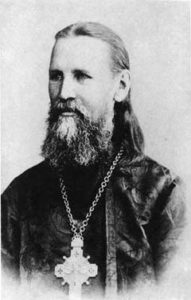 “A true Christian behaves in this life so that it may be a preparation for the future one and not only a life here below. In his actions, he does not think what will be said of him here but of what will be said there in heaven; he represents to himself that he is always in the presence of God, of the angels and all the saints, and remembers that someday they will bear witness of his thoughts, words, and deeds.” — Saint John of Kronstadt
“A true Christian behaves in this life so that it may be a preparation for the future one and not only a life here below. In his actions, he does not think what will be said of him here but of what will be said there in heaven; he represents to himself that he is always in the presence of God, of the angels and all the saints, and remembers that someday they will bear witness of his thoughts, words, and deeds.” — Saint John of Kronstadt
__________________________________________________________
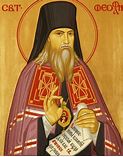
“Of all the holy works, the education of children is the most holy.”
— St. Theophan the Recluse


